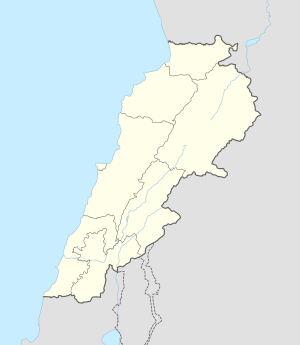Aley
|
Aalay عاليه |
|
|---|---|
| City | |
| Location in Lebanon | |
| Coordinates: 33°48′29″N 35°36′45″E / 33.80806°N 35.61250°E | |
| Country |
|
| Governorate | Mount Lebanon Governorate |
| District | Aalay District |
| Government | |
| • Mayor | Wajdi Mrad |
| Area | |
| • Total | 3.30 sq mi (8.54 km2) |
| Elevation | 1,968-3,117 ft (600-950 m) |
| Population | |
| • Total | 100,000 |
| • Density | 30,000/sq mi (12,000/km2) |
| Almost doubles During the summer | |
| Time zone | EET (UTC+2) |
| • Summer (DST) | +3 (UTC) |
Aalay (Arabic: عاليه), is a city in Lebanon. It is located 15 km uphill from Beirut on the Freeway that leads to Damascus. It is also the capital of the Aalay District and fourth largest city in Lebanon and one of the most important cities in Lebanon. Aley earns the nickname 'Bride of the Summer' (عروس المصايف) due to its importance in Tourism. It earns also many other nicknames like 'The capital of the Mountains' (عاصمة الجبل) and the Lebanese 'City of Fog' (مدينة الضباب) due to its foggy weather even in the summer.
Aley can be claimed to be the city with largest Druze population in the world. The natives are predominantly Druze; however, there are Christian Melkite, Orthodox, and Maronite minorities. Many outsiders, especially from Arab countries of the Persian Gulf, own homes in Aley where they spend their summers, escaping the heat and humidity in their own countries.
The word "Aley" derivatives from Aramaic, and means "high place," referring to the town's high altitude above sea level. (up to 950m)
Aley gained prominence upon the completion of the Beirut–Damascus Railway in the mid-1890s. The railroad provided the residents of Beyrouth easy means of transportation to the mountains, and this made Aley a popular destination to spend the summer months and enjoy its pleasant climate. It was the site of a serious accident on 12 April 1904, when part of the locomotive exploded and the train fell backwards down the 7% grade, killing 8 and seriously injuring another 21.
The city was for a while the summer capital of the Ottoman governors of Mount Lebanon. Kamil Pasha made Aley his capital and organised a Diwan, where he executed a large number of Lebanese and Arab martyrs who sought independence from the Ottomans. Also, a Jewish community once frequented this multi-cultural city, and they maintained a synagogue in Souk Aley, but it has since been abandoned. In 2001, the municipality of Aley began renovating the downtown area, especially its historic souk, and the city quickly revived its role in Lebanon's tourism.
...
Wikipedia

